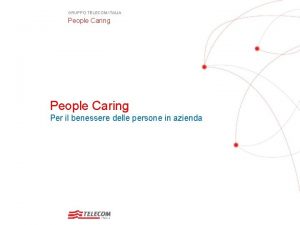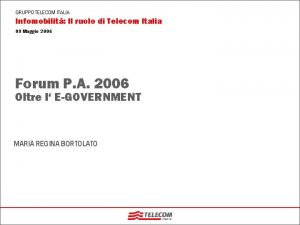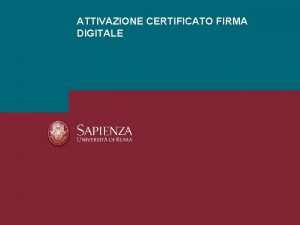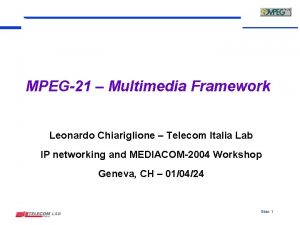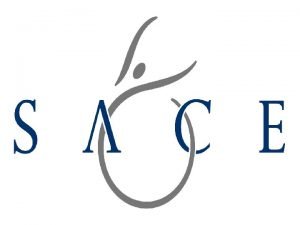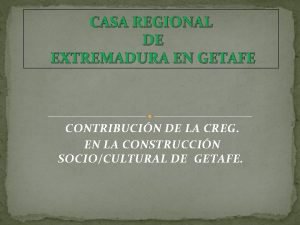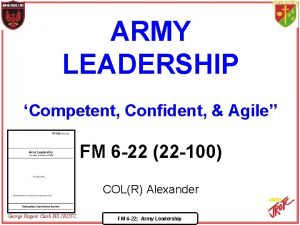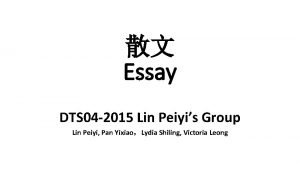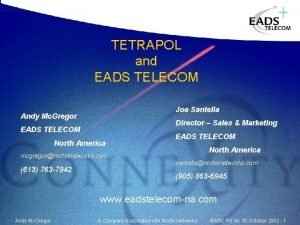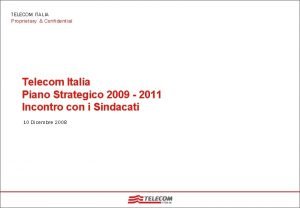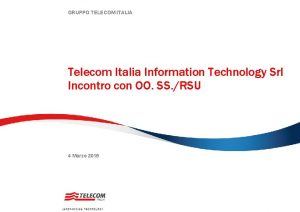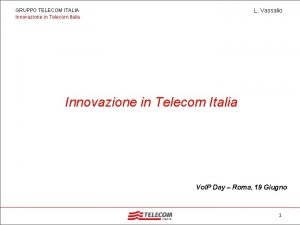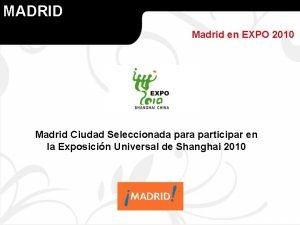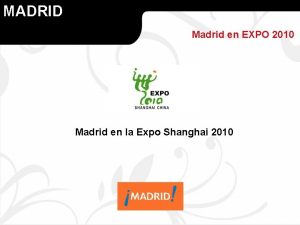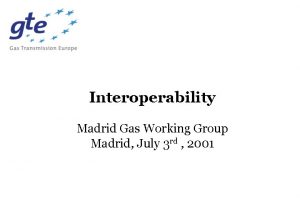TELECOM ITALIA GROUP Sustain IT 2015 Getafe Madrid
















- Slides: 16

TELECOM ITALIA GROUP Sustain. IT 2015 Getafe, Madrid, April 14 th, 2015 Panel discussion on “Green networking and renewable energy sources” Mobile networks and “green” energy sources: an operator point of view Damiano RAPONE Telecom Italia - Engineering&TILab

Agenda Telecom Italia presentation Energy Efficiency in Telecom Italia The importance of Green ICT Conclusions Q&A Green networking and renewable energy sources Damiano Rapone – Engineering&TILab, Wireless Access Innovation dept. 2

Telecom Italia group Employees 66. 025 TIM lines in Italy 30. 300. 000 Revenues (€) 21. 573. 000 Values referred to December 2014 http: //www. telecomitalia. com/tit/en/about-us/profile. html 1/2 Telecom Italia is the main telecommunication and ICT operator in Italy, as well as one of the most important in Latin America and among the main global mobile operators Italian leader in the ICT market, active in the following sectors: fixed and mobile communications, internet and media, systems and solutions for business, R&D Strategic markets: Italy, Brasil Green networking and renewable energy sources Damiano Rapone – Engineering&TILab, Wireless Access Innovation dept. 3

Telecom Italia group 2/2 The international presence Italy International Wholesale services Telecom Italia Sparkle (TI Sparkle) is a global service provider offering voice, data and internet solutions to fixed and mobile carriers, Internet Service Providers (ISPs), multimedia operators and corporate customers. Latin America: Brasil http: //www. tisparkle. com/document_loader. aspx? id. Document=1318 Green networking and renewable energy sources Damiano Rapone – Engineering&TILab, Wireless Access Innovation dept. 4

Focus on TILab: Wireless Access Innovation Main activities of the department 4 R&D activities, scouting, benchmarking, testing, performance evaluation of wireless systems (LTE/LTE-A), study of innovative radio access technologies towards 5 G 4 Technological trials, support to engineering department 4 Participation in standardization bodies and fora (3 GPP, ETSI, ITU, NGMN) 4 International funded projects, collaboration with vendors and academic world https: //www. ict-earth. eu/ http: //www. ict-ijoin. eu/ http: //wireless. kth. se/blog/projects/5 green/ https: //www. metis 2020. com/ http: //www. miwaves. eu/ Green networking and renewable energy sources Damiano Rapone – Engineering&TILab, Wireless Access Innovation dept. 5

Energy Efficiency in Telecom Italia (1/2) 4 EU funded research projects EARTH project (Energy Aware Radio and ne. Tworking tec. Hnologies) 4 E 4 5 Gr. EEn project (Towards Green 5 G Mobile Networks) 4 EXAM (Energy efficient Xhaul and M 2 M) 4 ETSI normative [ETSI Environmental Engineering (EE), sub-group Eco Environmental Product Standards (EEPS)] 4 TS 102 706: “Measurement Method for Energy Efficiency of Wireless Access Network Equipment” 4 Other “green” activities: 4 LTE auction in Italy 4 Energy Efficiency (EE) and power consumption measurements 4 DREAM project Green networking and renewable energy sources Damiano Rapone – Engineering&TILab, Wireless Access Innovation dept. 6

Energy Efficiency in Telecom Italia (2/2) Environmental sustainability initiatives 4 Telecom Italia contributions in: 4 Development of the new version of the EC Code of Conduct on Energy Consumption of Broadband Communication Equipment (BB Co. C V 5) 4 ITU-T’s “green” standards (Recommendations L. 1002, L. 1340 and L. 1010) 4 “New sustainability model for the TLC/ICT sector” agreement (May 21 st, 2012) 4 Signed between Telecom Italia and the Italian Environment Ministry 4 Commitment in buying electricity from renewable sources only 4 Guarantees of Origin ensuring the use of renewable sources only Telecom Italia S. p. A. is 100% powered by renewable energy 4 Further reduction of the environmental impact of Telecom Italia’s activities (-70 % CO 2 emission) 4 Smart Center 4 Telecom Italia is the 2 nd largest user of electric power in Italy (2. 2 TWh/year) 4 Country-level monitoring of the energy consumption of the infrastructure (radio base stations, data centers, offices, shops and laboratories) 4 Telecom Italia Green networking and renewable energy sources Damiano Rapone – Engineering&TILab, Wireless Access Innovation dept. 7

The importance of Green ICT (1/2) 4 Currently 3% of the world’s annual energy consumption is related to Information and Communication Technology (ICT) infrastructures 4 Mobile communication systems represent ~ 15% of total ICT sector 4 ~ 10% of ICT’s energy consumption can be attributed to mobile systems ICT’s energy consumption rises at ~ 15 -20% per year 4 ICT is thus a quickly-growing contributor to CO 2 emissions 4 ~ 2% of the worldwide CO 2 emissions (comparable to airplanes, ~ 25% of cars’ emissions) 4 Within ICT, mobile communication systems contribute ~ 12% in CO 2 emissions 4 Expected to grow by nearly a factor of 3 in 2020 (with respect to 2002 emissions) Green networking and renewable energy sources Damiano Rapone – Engineering&TILab, Wireless Access Innovation dept. 8

The importance of Green ICT 4 Mobile network’s energy consumption grows rapidly because of the dramatic mobile data traffic increase (2/2) 4 Thepriceofelectricityiscontinuously increasing (+10% annually in European Union) 4 This affects the operators’ OPerational EXpenditures (OPEX) Reducing energy consumption not only a matter of being green and responsible but also economically sustainable Green networking and renewable energy sources Damiano Rapone – Engineering&TILab, Wireless Access Innovation dept. 9

Mobile networks and renewable energy sources: a possible synergy 4 Improve the Energy Efficiency (EE) in all components of the mobile network The key source of energy consumption is the operation of base stations (60 -80% of the network’s total energy consumption) 4 Replacing traditional power sources with renewable “green” solutions not only benefits the environment but also positively impacts operator’s OPEX 4 Green energy saves on-grid power consumption 4 Green power generation dependent on the power generators’ geo-locations and weather conditions 4 Excess electricity sold to the electrical grid 4 Higher cost-per-watt of renewable sources (if connected) 4 Diesel-powered generators no more needed (in on-grid sites) 4 Additional CApital EXpenditures (CAPEX) due to power generation infrastructure and batteries 4 Base station located away from electrical grid 4 Backup batteries to maintain the base station active when green energy is not sufficient 4 System still works if electrical grid is off Green networking and renewable energy sources Damiano Rapone – Engineering&TILab, Wireless Access Innovation dept. 10

Conclusions 4 ICT’s energy consumption rises at ~ 15 -20% per year 4 Both increasing electricity price and foreseen traffic data growth negatively impacts operator’s OPEX 4 Reducing network’s energy consumption for economic and environmental sustainability renewable energy sources 4 Improving the Radio Access Network infrastructure (i. e. , base stations) Energy Efficiency is the key to Green ICT Green networking and renewable energy sources Damiano Rapone – Engineering&TILab, Wireless Access Innovation dept. 11

Q&A Damiano Rapone damiano. rapone@telecomitalia. it s s e c c A s s n e o l i re vat i W nno I 12

Backup slides Green networking and renewable energy sources Damiano Rapone – Engineering&TILab, Wireless Access Innovation dept.

Mobile Energy Efficiency (1/2) 4 In mobile communication networks a large part of the carbon footprint stems from electricity consumption during operation and manufacturing (2007) 4 Most of the today’s power consumption comes from the RAN: 4 high number of sites 4 high and not scalable base station consumptions Green networking and renewable energy sources Damiano Rapone – Engineering&TILab, Wireless Access Innovation dept. 14

Mobile Energy Efficiency (2/2) 4 Radio access network energy consumption is a considerable portion of the entire energy consumption of the mobile network, both considering already deployed network but also growth forecasts due to the increasing mobile ultrabroadband traffic demand 4 Areas of potential improvements: at component / node level: 4 Hardware (HW) improvements can give in a first stage the most of the gains; in general each new HW generation is typically more energy efficient but will reside unchanged in the network for several years at system and network level: 4 New functions, network management mechanisms and RRM algorithms, features typically implemented in SW; potentially can be upgraded and introduced in the network over the lifetime of several HW generations. Green networking and renewable energy sources Damiano Rapone – Engineering&TILab, Wireless Access Innovation dept. 15

The simple truth about mobile Energy Efficiency… 4 Up to now conventional design of Mobile Networks is performed by considering full load (maximization of the capacity of the nodes; performances traditionally evaluated in terms of spectral efficiency) 4 But in practical situations the problem is that: 1. most of the time the network is not loaded 2. in that period base stations still consume a lot ed ad t as c lo w i is aff y r rg w t e en f lo h c so u M ime t in Source: EARTH D 2. 3 deliverable. (for further details see backup slides at the end of the presentation) Green networking and renewable energy sources Damiano Rapone – Engineering&TILab, Wireless Access Innovation dept. 16
 People caring telecom italia
People caring telecom italia Oa telecom italia
Oa telecom italia Telecom italia
Telecom italia Firma digitale telecom italia
Firma digitale telecom italia Telecom italia lab
Telecom italia lab Polizza credito fornitore sace italia su italia
Polizza credito fornitore sace italia su italia Residencia medinaceli getafe
Residencia medinaceli getafe Casa de extremadura getafe
Casa de extremadura getafe Building commitment
Building commitment Fm 6-22 army leadership
Fm 6-22 army leadership Sustain oc
Sustain oc How to sustain a men's ministry
How to sustain a men's ministry What is bscs billing system
What is bscs billing system Dts group 2015
Dts group 2015 Ala market from apex telecom
Ala market from apex telecom Eads telecom
Eads telecom Telecom risk management
Telecom risk management
